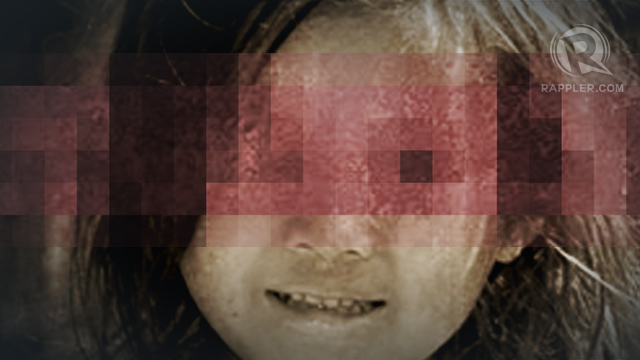SUMMARY
This is AI generated summarization, which may have errors. For context, always refer to the full article.

MANILA, Philippines – Blocking child pornography websites will drive foreign pedophiles and their local sources of pornography to private chat rooms, making them harder to trace.
This is according to lawyer Dante Bonoan, head of the National Bureau of Investigation (NBI) Inter-Agency Council Against Trafficking (IACAT).
While still supporting the move, Bonoan said the proposal will force those engaged in the widespread sale of child pornography to “change their style” – an observed pattern of syndicates whenever a new regulation is introduced.
Bonoan cited as an example prostitution syndicates that opted to use private parties as a front for their illegal trade, after operatives raided the bars where they conducted their operations.
With the Philippines considered as a global source of child pornography, the Department of Justice (DOJ) pushed for denying access to pornographic sites featuring children on most computers, smartphones, and tablets.
Local financiers have set up cybersex dens where poor Filipino children pose for nude photos and even live videos offered to mostly foreign customers. (READ: NBI: Online sex trade cottage industry in PH)
Child pornography is punishable under Republic Act (RA) 9775 or the Anti-Child Pornography Act.
DOJ Assistant Secretary Geronimo Sy, head of the department’s cybercrime office, finds no reason not to extend the regulation online. (READ: Why block child porn? ‘We can’t sell children like shoes’)
The system: Gov’t and private sector
The DOJ envisions an automated system of blocking child pornography sites in partnership with local telecommunication companies and Internet service providers (ISPs).
Having worked with the Child Pornography Council, the DOJ is coming up with an automated filtering software.
The automated filtering is needed due to the sheer volume of the sites, which have been culled from a list of “banned websites worldwide.” These are blacklisted sites by the International Criminal Police Organization and the European Police Office.
“But at the same time,” Sy said, the DOJ is “also advocating self-regulation.”
“Huwag naman lahat i-asa sa gobyerno (Don’t rely only on the government),” he said. “We rely on preventive, reactive measures.”
Justice Secretary Leila de Lima acknowledged not just the transnational nature of online child pornography but the urgency of addressing it both on the part of the government and the private sector.
She regarded the crime as “an offspring of the digital revolution,” which allows the abuse to proliferate “at close to the speed of light.”
“It cannot be solved by government alone because of the multivalent nature of this crime, which is carried out through Internet service providers and transacted using financial institutions,” she said in her speech at an October 29 anti-online child abuse dialogue.
Technological race
Bonoan said technology poses a challenge to authorities who now need to step up their game in tracking the operators behind the cash-for-child cybersex scheme.
As a filtering technology is developed by government, Bonoan said child pornography syndicates are sure to develop or acquire their own technology – if they haven’t yet – to counter the automated blocking.
He noted how the child cybersex industry is a billion-dollar global trade, which makes syndicates capable of engaging in a technological race with government.
De Lima herself acknowledged the capacity of these syndicates “concealed behind anonymous accounts and anonymized computers, darting through proxy servers across state boundaries, and protected by government-grade encryption methods.”
Bonoan said one cannot simply dismiss the fact that pornographic sites featuring Filipino children as young as 6 years old have paying subscribers worldwide.
The existing market of pedophiles would not be easy to dismantle, he said.
Harder for new markets to emerge
Perhaps the most important effect of the ban on child pornography sites is how it stems new markets for child pornography, Bonoan said.
He explained that sites that can be blocked are most likely the “advertised sites,” making it difficult for suppliers of pornographic material featuring Filipino children to find new customers.
As far as reconnecting with old subscribers, Bonoan said there are still the “private chat rooms” which are harder to block as they are used for other legitimate private exchanges.
Subscribers of existing child pornography sites will only be notified of the alternative set-ups by operators of the site, including which user to chat with and how payments can be made.
All these transactions were previously done in one single site. The dispersed operations will force authorities to bolster online spying methods.
Nonetheless, Bonoan said the ban elevates the costs of hosting child pornography. He said suppliers will be discouraged to involve themselves in this type of business, if the costs of putting up and continuing the trade is made higher.
This, he said, will make local financiers realize that their trade is no longer a profitable one.
Technology not a panacea
Bonoan assured the public that the technology will only complement, and not replace, the bulk of government operations combatting child pornography syndicates.
“It doesn’t mean mawawala na or magiging complacent (It doesn’t mean operations will stop or we will be complacent),” he said.
Current NBI efforts in the crackdown of these syndicates include online spying by registering in chat rooms and pornographic sites, coordinating with international law enforcement for leads, and raiding by virtue of court-ordered search warrants suspected cybersex dens.
Minors rescued in raid operations are taken into the custody of the Department of Social Welfare and Development (DSWD), which assists in their counseling and livelihood trainings.
Bonoan said the NBI IACAT at times provides job assistance to the rescued victims.
Bonoan is the former head of the NBI Anti-Human Trafficking Division, the unit conducting the raids. – Rappler.com
Add a comment
How does this make you feel?
There are no comments yet. Add your comment to start the conversation.